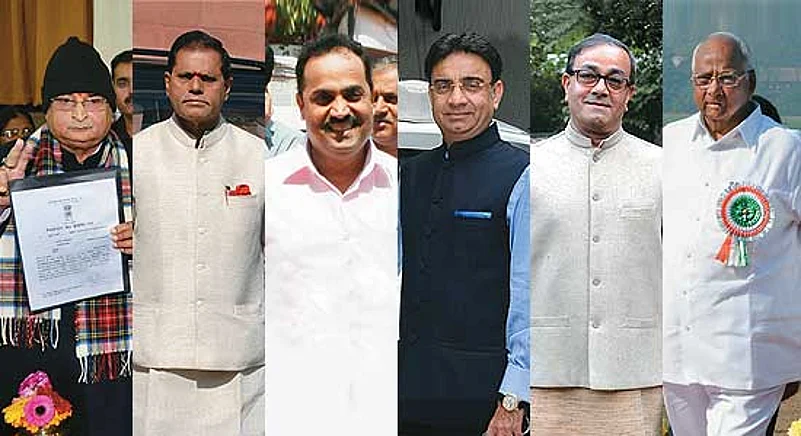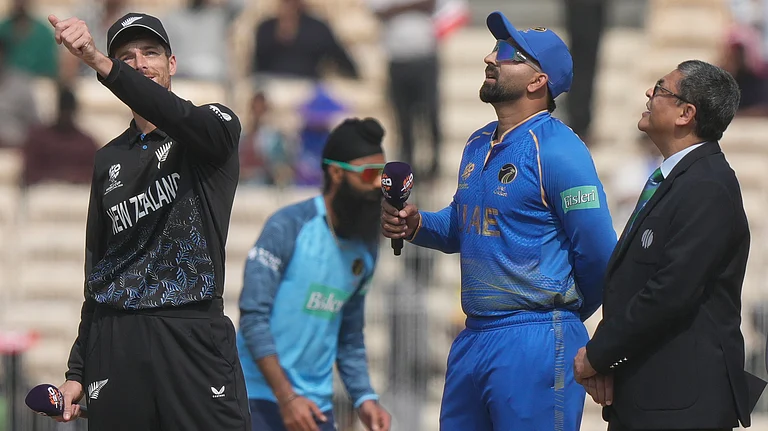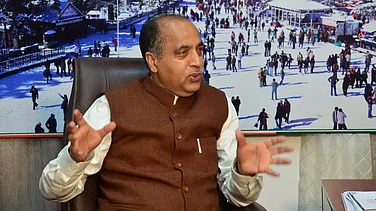Movers & Shakers
- Parimal Nathwani declared the highest annual income of Rs 16.01 crore, followed by Mithun Chakraborty (Rs 10.30 crore)
- 14 of the 58 candidates (24 per cent), including Rajkumar Dhoot, declared criminal cases pending against them
- Average assets of the 58 candidates amount to Rs 44.74 crore
- Assets of recontesting Congress candidate T. Subbarami Reddy increased by Rs 164.19 crore in six years
Source: ADR
***
It might have been politically incorrect. But Chaudhary Birender Singh, a Rajya Sabha MP from Haryana, was not wide of the mark when he said, “Politics is the best business in this country.” On another occasion, he raised a storm saying an RS member had confessed the seat cost him Rs 80 crore. There might be some smoke and fire in what Birender Singh said: after all, the CBI is investigating horse-trading during the 2012 RS elections.
To be sure, not every member spends that kind of money. This month, Hari Vansh, editor-in-chief of Prabhat Khabar and former PM Chandra Shekhar’s media advisor, sailed through to the RS as a JD(U) nominee from Bihar. He says he merely made a security deposit of Rs 10,000, refunded on his election.
But clearly, Rajya Sabha elections, which used to be a sedate affair, are getting more dramatic and unpredictable—what with moneybags and unusual suspects being fielded. Backroom negotiations, bargains and blackmailing, political considerations and corporate interests—increasingly, these are what determine the choice of candidates. The decisions are being taken by a handful of people, without much consultation and with hardly any transparency.
Recently, Sanjay Singh, the Congress MP from Sultanpur in Uttar Pradesh, filed his nomination for an RS seat from Assam, enraging locals, who think the Congress treats the eastern state as a “political dumping ground”. They don’t seem to mind that the prime minister is also an RS member from Assam; what has outraged them is the fielding of a lightweight from distant UP, probably to prevent him from going over to the BJP and contesting from neighbouring Amethi to make things difficult for Rahul Gandhi in the coming general elections.
Ironically, the requirement that a Rajya Sabha candidate be domiciled in the state is no longer in the statutes. The clause was done away with by the NDA. And a large number of politicians have regularly been elected from states other than their own. The Leader of the Opposition in the Rajya Sabha, Arun Jaitley, for instance, got elected from Gujarat though he’s from Delhi. Similarly, BJP leader and RS member Balbir Punj, denied a nomination this time, represented Orissa in the House. Prem Chand Gupta from Haryana got elected this time from Jharkhand, while Kanwar Deep Singh of the Alchemist Group and of ‘Republic of Chicken’ fame from Chandigarh is all set to get elected from West Bengal. Even Vijay Goel, a BJP leader from Delhi, has won a Rajya Sabha berth from Rajasthan this month.
The Rajya Sabha, besides being a revising and deliberative chamber, is also a federal chamber described as the Council of States. RS members are elected by elected members of state assemblies and the framers of the Constitution wanted this chamber to protect the interests of the states in the federation. It remains debatable, therefore, whether politicians from, say, Gujarat, can protect the interests of faraway Jharkhand. And whether it can lead to conflicts of interest.
The question assumes significance in view of Parimal Nathwani, group president (corporate affairs) of Reliance Industries, getting elected to the Rajya Sabha from Jharkhand for the second consecutive term this month. He is the only independent member to be elected twice to the Rajya Sabha. Members of the Jharkhand assembly voted to fill up both vacancies in the Rajya Sabha this time with outsiders, Nathwani from Gujarat and Prem Chand Gupta from Haryana. While Nathwani retained the seat he won in 2008, Gupta, a former Union minister and nominee of Laloo Prasad Yadav, shifted from Bihar, where the RJD did not have the required numbers to send him to the Rajya Sabha.
It was the richest Indian, Mukesh Ambani, says Nathwani on his website, who inspired him to get into the Rajya Sabha. Endowed with the support of both Ambani and the largest industrial house in the country, Nathwani could possibly have won a Rajya Sabha seat from wherever he chose. But there is no explanation why he could not or would not get elected from Gujarat (of which he’s a native) or even Maharashtra (where he has lived and worked).
Meanwhile, the trend of moneybags getting into Rajya Sabha continued unabated. Rajkumar Dhoot of Videocon, and Sanjay Kakade, a real estate player from Pune, were elected unopposed from Maharashtra. But the biggest splash was made by the BJP nominee from Bihar, Ravindra Kishore Sinha, a former “journalist and war correspondent”. Not because Sinha was preferred over former MP S.S. Ahluwalia but because Sinha and his wife declared combined assets of a whopping Rs 800 crore, becoming the richest MP in the Rajya Sabha, displacing another Bihar member, pharmaceuticals king Mahendra Prasad of the JD(U), who had declared assets worth Rs 683 crore. Prasad, an all-party favourite who has represented the Congress and RJD too in the past, is credited with having asked less than a dozen questions in the 40 years he has been an MP. Sinha, a protege of Murli Manohar Joshi, has built up a security and intelligence company worth Rs 3,000 crore and operates in India and Australia. The company boasts of a workforce of 78,000. He has also dabbled in education and has a residential school in Dehradun.
Also left out of the reckoning this time were BJP spokesperson Prakash Javadekar, who is being asked by a section of the party to contest for the Lok Sabha from Pune. Former Union minister Jayanthi Natarajan also finds herself out in the cold, with the Congress unable to arrange numbers in Tamil Nadu. Another Congress hopeful, former Delhi chief minister Sheila Dikshit, was cold-shouldered in favour of a much younger Union minister Kumari Selja.
While the House will see the likes of Mithun Chakrabarty, actor and TV host, and painter Jogen Chowdhury, both nominated by Trinamool Congress, and Majeed Memon, a prominent Mumbai criminal lawyer, nominated by the NCP, architect and sculptor Raghunath Mohapatra, nominated by the Biju Janata Dal in Orissa, ran into rough weather despite being propped up as an independent by CM Naveen Patnaik. The CPI(M) faced some awkward moments in West Bengal after fielding former student leader Ritabrata Banerjee, with party veteran A.R. Mollah publicly questioning why the party in Bengal continues to be dominated by Banerjees, Chatterjees and Bhattacharjees, Brahmins in short.
Postscript: Union minister Sharad Pawar(73) and Congress veterans Motilal Vora (85) and Digvijaya Singh (66) were elected unopposed to the Rajya Sabha but Lal Krishna Advani, still hoping to be the BJP’s prime ministerial man, indicated his resolve to contest for the Lok Sabha rather than the Rajya Sabha.


























